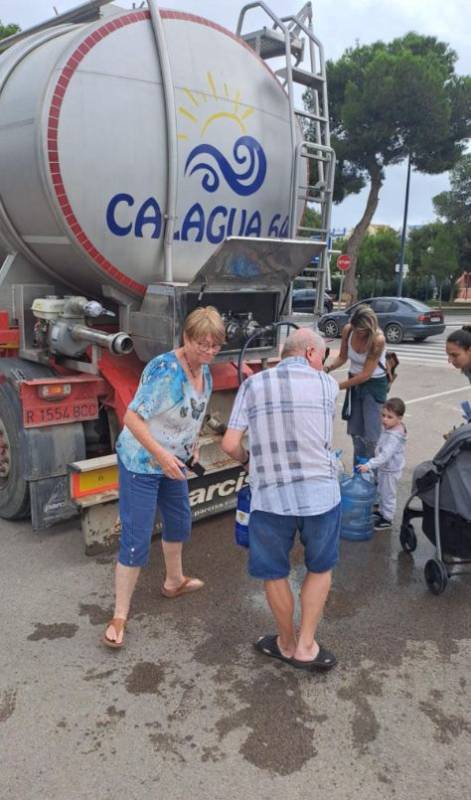Spanish News Today Editors Roundup Weekly Bulletin Oct 24
TOP STORIES: "Clocks go back this Sunday in Spain… for the last time ever?!" & "Murcia drinking water nightmare finally resolved"
Time marches on… indeed time Octobers on and Novembers on and all the rest of it. And, as part of the inexorable advance of time, it occasionally falls back… or autumns back, depending on which side of the pond you hail from. All of which is a long-winded way of saying that Daylight Saving Time ends this weekend.
Time, of course, heals all wounds, but can open up fresh ones. The hurt and distress caused by Storm Alice in the Mar Menor area of southern Spain is just beginning to abate, but for boars, bills and battered women in Spain there are fresh insults and injuries to endure.
Read all about it in this week’s Editor’s Roundup Weekly Bulletin.
Time to look forward
As the clocks get ready to go back, President of the Government of Spain Pedro Sánchez (as his full title has it) has decided he’s too busy to go twiddling the button on his watch twice a year and he’s had quite enough of the whole clock-changing business altogether, thank you very much.

This week, he announced that Spain has officially proposed to the European Union that Daylight Savings Time (DST) should be scrapped for good next year. Sánchez shared the news on social media, timing it perfectly to coincide with the week when Europe switches to winter time.
“This time change no longer makes sense,” he declared, pointing out that most people in Spain want it gone and that studies show it doesn’t even actually save energy anymore.
Instead, it just messes with our body clocks and our tempers, not to mention the stress of having to work out twice every year exactly how to change the oven clock and the microwave, and just where did I put those user manuals?
Spain put its case forward at the next EU Transport, Telecommunications and Energy Council meeting, where ministers will debate whether Europe should finally ditch the seasonal clock changes. It is actually something many Spanish people have been calling for for ages now, although it’s not yet clear whether the official suggestion is for Spain to stick permanently to summer or winter time.
Of course, it’s common knowledge that Spain’s time is off kilter anyway. Nearly a hundred years ago now, General Francisco Franco – in an effort to cosy up to Hitler – decided Spain should not be in the same time zone as Portugal and the UK (even though this makes much more sense, geographically speaking) and would instead be on Berlin time.
So things are already a little out of whack without adding DST into the mix. According to surveys, around two-thirds of people living in Spain want to stop the clock changes, and they’re not alone. Back in 2018, when the European Commission asked citizens what they thought, 4.6 million people replied and a whopping 84% said it was time to end Daylight Savings Time. The European Parliament even agreed the following year, but the plan stalled when not enough Member States could agree on what to do next.
Fast forward to today, and Spain seems determined to put the issue back on the EU’s agenda before the current review period ends in 2026. The logic is simple: the world has moved on since Daylight Saving Time was introduced in 1980, when the idea was to make better use of daylight and save electricity. Now, with modern energy systems, flexible working hours, and millions of us staring at screens long after sunset, the old arguments feel a bit… ahem… out of time.
Or, as the Spanish government very grandly put it, “Member States must listen to their citizens, heed scientific evidence and show that they are capable of updating their policies in line with the times.”
Of course, not everyone will be cheering the proposal. Some argue that without the clock changes, mornings in winter would be darker for longer, which might make the school run and daily commute even grimmer than it already is. Others worry that having different time zones across Europe could become a logistical nightmare if some countries keep switching and others don’t.
Still, for many, the idea of never having to remember whether we’re springing forward or falling back is an attractive one. If Sánchez gets his way and the EU agrees, 2025 could be the last time we’re all fiddling with clocks, phone settings and microwave displays. The end of an era, perhaps, but also, for millions, the start of a slightly more straightforward and orderly life. We can but dream (with our extra hour in bed this Sunday).
Water difference a week makes

After more than a week of lugging home those 8-litre bottles of water from Mercadona, residents in San Pedro del Pinatar, San Javier and Los Alcázares
can finally drink from the taps again. Health authorities have officially declared that the tap water supplied by the Taibilla Canals Association (MCT, for its initials in Spanish), is once again safe for human consumption.
It’s a milestone in what has been a frustrating, stressful and occasionally surreal ordeal following the chaos left by Storm Alice.
A reminder: the trouble began when the storm dumped torrential rain across the Region of Murcia, flooding parts of the Taibilla canal network and allowing contaminated run-off to enter the system. Practically overnight, thousands of homes found their water declared unfit to drink. Across the Mar Menor area, taps were suddenly off-limits, residents were warned to stick to bottled water, and cafés and restaurants scrambled to adapt. It may sound like a minor inconvenience, but when you can’t make a cup of tea or brush your teeth without second-guessing it, life becomes a bit more complicated.
Since then, teams from the MCT have been working around the clock to clean and disinfect 20 kilometres of canal and several reservoirs, including those at El Mirador and Roldán. In San Pedro del Pinatar, that effort has finally paid off. The water there was declared completely safe for drinking, cooking and all other uses this Wednesday. Nearby San Javier and Los Alcázares followed suit shortly after, though Torre Pacheco is dragging its heels. In some Pachequeño districts like Roldán and Balsicas, the water can still only be used for washing and cleaning even now.
For residents, it’s been a trying couple of weeks of uncertainty and disruption. Supermarkets ran short of bottled water, local councils set up emergency distribution points and many families found themselves improvising just to get by. While the situation is finally improving, it’s left a bitter taste (figuratively speaking).
The MCT has apologised for the inconvenience and says it hopes to have full normality restored across the Mar Menor area very soon. Meanwhile,
local councils such as Los Alcázares and
San Javier have set up helplines for residents seeking information about possible financial compensation for damage caused by the storm and losses linked to the water supply cuts.
The Mayor of Los Alcázares, Mario Pérez Cervera, has gone one step further, officially requesting that the MCT establish a compensation fund for affected households and businesses.
If you are one of those who have been affected by the whole episode and have suffered, you should contact the helplines in your municipality to see whether you might be eligible to receive some sort of compensation. But at the same time, please spare a thought for the parts of this country (see: parts of Almería) where drinking the water from the taps is never recommended, and people’s daily lives resemble the scenes in the Mar Menor municipalities over the last week.
Even though safe drinking water is flowing again in most Mar Menor homes, the Regional Ministry of Health has urged people not to rush straight back to filling kettles without taking a few precautions. They’ve issued a set of eight
recommendations to ensure that private plumbing systems are safe and free from any lingering impurities.

Top of the list is giving your taps, tanks and showerheads a good clean. Filters and diffusers should be removed, soaked in vinegar or a commercial cleaner, and then disinfected with a bleach solution before being put back in place.
For water heaters, the Health Department advises cranking the temperature up to the maximum for a couple of hours to kill off any unwanted bacteria, then running the taps for five minutes to flush everything through, while the pipes in garden sprinklers or irrigation systems should be cleared too.
For most residents, these steps are a small price to pay for getting back to normal. For many, the past week has served as a reminder of just how dependent we are on something as simple as turning on a tap. It was reminiscent of the ‘apagón’ blackout we all suffered about six months ago, when we were all without electricity for over 24 hours and we all realised that our modern comforts could be stripped at any moment, and that we’re like headless chickens without them.
Still, that’s the end of that now. And it will never happen again. Will it?
Murcia
Away from the undrinkable water, Storm Alice’s effects are also visible in the Mar Menor, where scientists have sounded the alarm about what could be another bout of the dreaded “green soup”. Researchers have detected a sharp rise in chlorophyll levels in the beloved lagoon, meaning the water is once again too rich in nutrients. Under these conditions, when calm, sunny weather follows heavy rainfall (such as we’re seeing this weekend), the lagoon can erupt into a bloom of microalgae that guzzles up oxygen and suffocates the life below.
It’s a familiar, if still troubling, story for anyone who has followed the Mar Menor’s environmental fortunes over the last few years. To tackle the long-term problem of pollution,
scientists and environmentalists have launched the lagoon’s first oyster reef near the Isla del Barón, slap bang in the middle of the lagoon. Some 55,000 native flat oysters, bred at the Murcia Oceanographic Centre, have been introduced to filter the lagoon’s water naturally.
Oysters are nature’s vacuum cleaners – they can filter huge volumes of water, removing nutrients and impurities. In fact, the team estimates that these oysters could retain up to 100 tonnes of nitrogen each year, about a fifth of what the lagoon currently receives. “The goal is to study how oyster farming can naturally reduce pollution,” said project coordinator Marina Albentosa.
Elsewhere along the coast, Cartagena has been facing a rather different kind of wildlife issue. Wild boars have been making themselves a little too comfortable in urban areas for the authorities’ liking. The animals have been spotted rooting through bins, crossing roads and the like, and now the Ministry of the Environment, together with the City Council, has now set up
cages to catch the little piggies.
The idea is to lure them in with bait, trap them and sadly, due to European regulations that prevent relocation, put them down “humanely”, if such a thing is not a contradiction in terms. Authorities believe there could be as many as thirty boars roaming around the city, and people are being warned to keep their distance, especially those walking dogs, as the boars can get a bit stroppy when startled. Still, it hardly seems a justification for culling them, does it?
To the airport now, where
the winter flight schedule kicks off this Sunday, at the same time as the clocks go back. No more bumper flights going everywhere at all hours as we have seen in the summer. No, as the summer rush fades, the airport will operate just 11 regular routes between October 2025 and March 2026.
It’s not much, but it’s more than the last winter season and includes new connections we didn’t have then. There are now year-round flights to Tenerife North thanks to Spanish airline Binter, while Air Arabia will maintain a link to North Africa with flights to Nador, Morocco, instead of Marrakesh and Oujda as they had previously. Plus, a direct connection to Bristol from Murcia courtesy of easyJet, which we didn’t have last year.

Not surprisingly, the UK remains Murcia’s biggest market year-round, with both Ryanair and easyJet running flights to three London airports, as well as Manchester, Birmingham and Bristol, while Dublin keeps Ireland in the mix.
It’s a quiet victory for Corvera. Passenger numbers are up slightly (just over 767,000 so far this year, a modest 2.3% increase on 2024), and we see a gradual increase in the number of both winter and summer flight destinations available with each passing year. It may be a case of two steps forward and one step back, but it’s still a step in the right direction.
Of course, the onset of winter also means it’s the start of flu season, and the Region of Murcia’s health department is rolling up its sleeves (quite literally!) to deal with a spike in both the regular flu (‘gripe’) and other respiratory viruses. Vaccination centres are now opening in the afternoons and even on Saturdays to accommodate demand.
If you’re over 60,
you are strongly encouraged to get the flu jab, while children aged between six months and nine years are also being vaccinated, both at health centres and in schools. That also goes for pregnant women and anyone with a weakened immune system who might be disproportionately affected by getting the flu or even those who would come into regular contact with them.
The latest figures show flu cases rising by nearly 39% in a single week, but a simple vaccine is all it takes to keep your defences up for another year. You can very easily book a time to get a jab online, by phone or just by turning up in person to your local health centre. Protect yourself and others: get vaccinated!
For other things going on in the Region of Murcia this weekend and beyond, remember you can always see our EVENTS DIARY:
Spain
Leading the week’s Spain news, there has been a
sharp jump in energy costs recently. Electricity bills have taken a leap, soaring by 40% in October compared to last month. What’s surprising is that this spike happened despite a warm and mild start to autumn.
Experts say it isn’t just about the weather, though. Reduced sunlight and less wind mean Spain’s renewable sources are producing less energy, and market fears about gas supplies tightening this winter are already pushing prices up.
Antonio Aceituno, CEO of Tempos Energía, offered a hopeful note, saying, “If the winter stays mild and liquefied gas continues to flow normally, electricity prices could remain contained.” But he also warned, “Should things turn colder, prices could rise again,” adding a layer of uncertainty for those counting on keeping their bills manageable.
We’re talking about energy costs being felt by everyone, both when the kettle boils and when the heaters kick in.

On the tech front, the digital world hit a speed bump earlier this week when
Amazon’s cloud services crashed, causing chaos across multiple sectors. You might have noticed your favourite apps glitching or online payments stalling.
The big four banks in Spain, BBVA, CaixaBank, Santander and ING, were among those struggling to keep their online platforms running. Payment services like Bizum and Ticketmaster also faced issues, leading to problems at ATMs and card terminals nationwide. Telecom giants Movistar, Orange and Vodafone weren’t spared either, experiencing disruptions that added to the wider frustration.
Amazon traced the problem to a critical part of its US data centre, DynamoDB, and managed to resolve the issue within four and a half hours. It was a stark reminder of how deeply woven cloud technology is into our daily lives.
Next time you tap your card or watch a video, remember it’s all riding on some seriously complex infrastructure behind the scenes.
And that’s not all. There’s also a plan to introduce up to 15 days of paid leave for employees caring for loved ones in palliative care, with flexibility to split the leave over three months if necessary. Imagine being able to ease back on work hours to support a family member in their final days without worrying about pay.
Labour Minister Yolanda Díaz didn’t hold back in her comments, saying, “No one can go to work properly two days after the death of a father, a mother, a son, a daughter, a friend.”
While unions are applauding the move, some business groups are urging a balanced approach. If approved, it would be a significant step towards recognising the realities families face during difficult times.
Between March and June this year, courts dealing with violence against women logged over 51,000 complaints, supporting nearly 48,000 victims. In the Canary Islands, the rise is especially steep, with complaints up by a staggering 45%, making it the region with the highest victim rate nationally.
Online violence now is part of the problem, too. More than 73% of women report experiencing digital abuse. Pedro Fernández, the Spanish Government’s delegate in Andalucía, highlighted the urgency, calling for “an institutional and technological response to the rise in sexist digital attacks.”
While the sheer scale of the problem is worrying, it’s also true that a rise in the amount of gender violence reported may not reflect a real rise in the number of gender-motivated crimes being committed, but rather a greater willingness on the part of victims to come forward about it. Either way, tackling these issues means legal action alone isn’t enough; education, awareness and collective responsibility must come into play to make a real difference.
Alicante
A heavy urban pump truck with six firefighters on it, plus a command vehicle, were sent to a unit at the commercial centre on Calle República Dominicana in Pueblo Principe urbanisation.
The whole establishment was filled with smoke and, once they had put out the flames, they used fans to ventilate all the rooms. Fortunately, no-one was injured but there was significant material damage.
No less than seven ships, with capacity for a total of about 19,000 passengers, were able to disembark and take in the sights, sounds and flavours of the provincial capital for the day.
Two of these were bringing travellers from Great Britain: the Cunard Queen Anne and the Arvia, both owned by Carnival UK, with up to 2,996 and 5,200 passengers on board and arriving on Saturday and Sunday respectively.
A more international line-up followed, including three MSC cruise liners, a Norwegian one coming from the USA and one from Cyprus. The port is being promoted by the Alicante Costa Blanca association for cruise tourism (ALCTC), which must be doing a great job as the figures set a new record.
It is hoped, of course, that the benefits of all these tourists will trickle down into the local economy, as shops, restaurants and local sightseeing attractions tempt them to part with some of their holiday money. Since they’re clogging up the place for residents and not going to stay at any local hotels, it’s the least they could do to buy a trinket from the souvenir shop.
And finally, residents of San Fulgencio must have had quite a shock to see armed National Police swoop in to
catch a band of foreign fugitives in broad daylight earlier this week.
Officers intercepted a vehicle carrying three people, all of whom ended up being detained. Two of them turned out to be wanted by the authorities in Germany and the other was arrested for trying to prevent officers from arresting them.
The fugitives were allegedly part of an organised gang based in Bremen (Germany), where they burgled homes and committed fraud by making phone calls posing as bank employees in order to swindle money and valuables out of victims.
These wanted men may have thought they could evade detection in this sleepy Vega Baja municipality, by blending in with the many expats who make up the majority of the local population.
But after the German authorities issued European Arrest Warrants indicating that the suspects may be in Alicante province, it did not take Spain’s National Police to track them down.
The suspects, aged 25, 27 and 34, are all German citizens and the High Court (Audiencia Nacional) in Madrid will process the two fugitives’ extradition.
Andalucía
Often described as the voice of Ireland in European film, Sheridan’s career stretches over four decades and is renowned for its emotionally charged storytelling, exploring the complexities of social, political, and family life in Ireland.
His landmark films, including My Left Foot, which earned him an Academy Award, and In the Name of the Father, not only gained critical acclaim but also launched Daniel Day-Lewis’s career into stardom. Sheridan’s collaboration with Day-Lewis is regarded as one of cinema’s most successful director-actor partnerships.
Beyond these classics, Sheridan has demonstrated versatility with international productions like Behind the Walls, starring Daniel Craig and Naomi Watts, and Brothers, featuring Tobey Maguire and Natalie Portman. He has also nurtured emerging Irish talents through his work as a producer. Good for him.
Festivalgoers will have the opportunity to see Sheridan’s latest film, Re-creation, co-written and co-directed with David Merriman. This gripping courtroom drama revisits one of Ireland’s most controversial cases, offering a modern take inspired by the classic film Twelve Angry Men.
The two-metre-long turtle, a rare visitor to Mediterranean waters typically originating from the Atlantic or Indian Oceans, was found by beach workers and handed over to CEGMA, the Centre for the Sustainable Management of the Andalusian Marine Environment.
This respected centre, known for its successful work rescuing and studying marine wildlife, will now investigate the cause of death. So far this year, CEGMA has treated 19 turtles and boasts a recovery success rate of over 75%, underlining its crucial role in protecting Andalucia’s marine ecosystem.
While the exact cause of this turtle’s death remains unknown, experts hope to gather insights from the samples collected, helping to understand the increasing threats faced by these ocean wanderers as they navigate busy seas near the Strait of Gibraltar.
Speaking of creatures making unexpected appearances, Málaga is currently facing a significant
surge in ‘mutant’ rat sightings that is causing concern among residents and health experts alike. This year has seen a notable increase across several neighbourhoods.
Sergio Monge, president of the National Association of Environmental Health Companies (ANECPLA), warns, “This is more than a nuisance; it’s a serious public health issue.” Rats can carry over 30 diseases, ranging from leptospirosis to hantavirus, making their presence a real health risk.
Two main reasons lie behind this sharp rise: many rats have developed a genetic mutation that grants them resistance to commonly used poisons, while stricter EU regulations now limit the strength and usage of these rodenticides.
Monge stresses that tackling the problem won’t be simple. He urges residents to do their part by properly managing waste, sealing entry points and keeping rats in their natural habitat underground. “Wherever rats find food and shelter, they settle, so prevention is vital,” he says.
For many neighbourhoods already struggling with infestations, this ongoing challenge is prompting calls for stronger municipal measures to protect public health and restore peace of mind to Málaga’s communities. Otherwise, it’ll be a rat-astrophe!
You may have missed…
- New EU driving licence rules allow 17-year-olds to hit the road.
After a couple of years in the planning stages, the European Union has given the green light to a brand-new driver’s licence that allow motorists across all its Member Stats to obtain a licence from the age of 17, among a raft of other changes. There are also plans to introduce a digital driving licence that will be common throughout the EU by 2030.
- Why and how to get an FNMT digital signature in Spain.
It’s the free digital document every expat in Spain must get… this legal ‘Digital Signature’ is the only key you need to sign contracts and handle all Tax Agency and official paperwork from home.
- 10 deadly black spots put Murcia among Spain’s most dangerous regions for drivers.
Every year, the European Motorists’ Association crunches the numbers to reveal Spain’s most dangerous roads, and the Region of Murcia has found itself in the spotlight once again.
- Ozone pollution hits highest level in eight years.
Ozone pollution across the Region of Murcia has hit its highest level since 2017. A new report from Ecologists in Action links the rise to industrial activity, heavy traffic and two intense summer heatwaves, with harmful air affecting the whole region.
- Relive your youth at unforgettable concerts with Rewind Spain.
“They were the best days of our lives,” sang Bryan Adams, but you can experience them all over again thanks to the concerts put on by Rewind Spain!
And that’s your lot for this week. Thanks for reading and don’t forget to put your clocks forward back on Saturday night (if you still have anything analogue and not ‘smart’ left in the house, that is).
See you next week!




 This week, he announced that Spain has officially proposed to the European Union that Daylight Savings Time (DST) should be scrapped for good next year. Sánchez shared the news on social media, timing it perfectly to coincide with the week when Europe switches to winter time.
This week, he announced that Spain has officially proposed to the European Union that Daylight Savings Time (DST) should be scrapped for good next year. Sánchez shared the news on social media, timing it perfectly to coincide with the week when Europe switches to winter time.
 After more than a week of lugging home those 8-litre bottles of water from Mercadona, residents in San Pedro del Pinatar, San Javier and Los Alcázares can finally drink from the taps again. Health authorities have officially declared that the tap water supplied by the Taibilla Canals Association (MCT, for its initials in Spanish), is once again safe for human consumption.
After more than a week of lugging home those 8-litre bottles of water from Mercadona, residents in San Pedro del Pinatar, San Javier and Los Alcázares can finally drink from the taps again. Health authorities have officially declared that the tap water supplied by the Taibilla Canals Association (MCT, for its initials in Spanish), is once again safe for human consumption. Top of the list is giving your taps, tanks and showerheads a good clean. Filters and diffusers should be removed, soaked in vinegar or a commercial cleaner, and then disinfected with a bleach solution before being put back in place.
Top of the list is giving your taps, tanks and showerheads a good clean. Filters and diffusers should be removed, soaked in vinegar or a commercial cleaner, and then disinfected with a bleach solution before being put back in place.
 Not surprisingly, the UK remains Murcia’s biggest market year-round, with both Ryanair and easyJet running flights to three London airports, as well as Manchester, Birmingham and Bristol, while Dublin keeps Ireland in the mix.
Not surprisingly, the UK remains Murcia’s biggest market year-round, with both Ryanair and easyJet running flights to three London airports, as well as Manchester, Birmingham and Bristol, while Dublin keeps Ireland in the mix. On the tech front, the digital world hit a speed bump earlier this week when Amazon’s cloud services crashed, causing chaos across multiple sectors. You might have noticed your favourite apps glitching or online payments stalling.
On the tech front, the digital world hit a speed bump earlier this week when Amazon’s cloud services crashed, causing chaos across multiple sectors. You might have noticed your favourite apps glitching or online payments stalling. Closer to home, and the Spanish workforce may soon get a boost in compassionate leave. The Ministry of Labour has proposed a major overhaul, suggesting that bereavement leave for close family members could increase from two days to 10.
Closer to home, and the Spanish workforce may soon get a boost in compassionate leave. The Ministry of Labour has proposed a major overhaul, suggesting that bereavement leave for close family members could increase from two days to 10. This week there has been some exciting news from the world of cinema. Acclaimed Irish director Jim Sheridan, known for classics like My Left Foot and In the Name of the Father, is set to receive the prestigious Giraldillo de Honor at this year’s Seville European Film Festival.
This week there has been some exciting news from the world of cinema. Acclaimed Irish director Jim Sheridan, known for classics like My Left Foot and In the Name of the Father, is set to receive the prestigious Giraldillo de Honor at this year’s Seville European Film Festival.
















